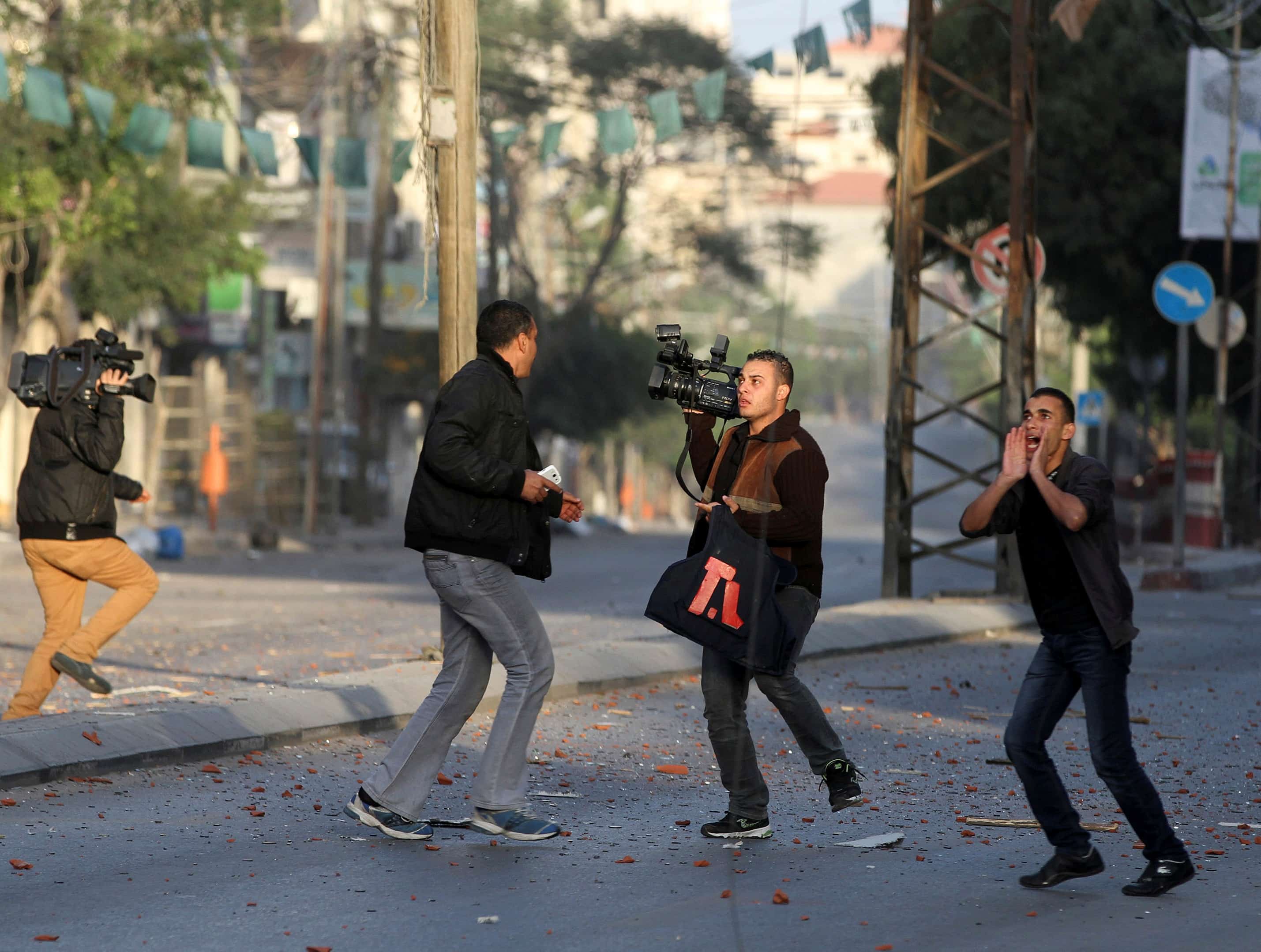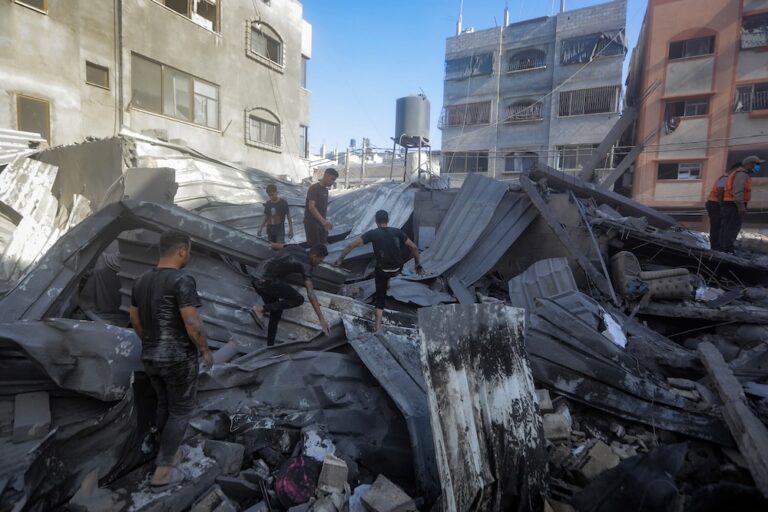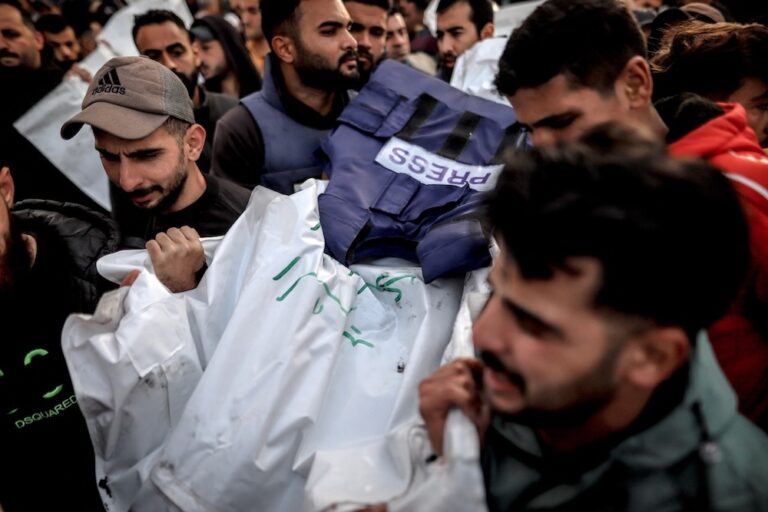An annual report published by the Palestinian Centre for Development and Media Freedoms (MADA) finds that the status of media freedom in Palestine has had no promising signs of improvement since the start of the year.
At a press conference held by the Palestinian Center for Development and Media Freedoms (MADA) which reviewed the findings of the annual report on violations against media freedoms in Palestine during 2012, members of MADA discussed the nature of the violations documented throughout the year. The conference was held at MADA’s headquarter in Ramallah on the morning of 27 March 2013.
Opening remarks were delivered by the Chairman of the Board of Directors, Dr. Ghazi Hanania, who noted that the past year witnessed a serious escalation in violations against journalists by the Israeli forces, who, he says, had no qualms with killing three journalists deliberately during Israel’s latest offensive against the Gaza Strip.
Hanania added, “The Israeli authorities were not even bothered to justify their murders which conveys to what extent Israel’s disregard for laws and international conventions has reached. Not only that, but its disregard for the lives of Palestinian journalists, whereby not only their freedom to express themselves has been violated but also the most important human right, the right to live.”
Hanania then explained that reporting on Israeli violations heavily does not mean that Palestinian violations do not exist as well. “Although we always confirmed that the Israeli violations are the most dangerous and threatening to the lives of Palestinian journalists and the most frequent too, but the Palestinian violations are still high in numbers. They have, however, decreased compared to 2011, where the Fatah-Hamas division created a fertile ground for violations to arise in the West Bank and Gaza.”
Hanania spoke to those present at the conference about MADA’s role in defending media freedoms, either by monitoring violations and publishing press releases, monthly reports, annual reports, and special reports, or through the activities of its legal unit, which works on defending journalists and spreading legal awareness through seminars and workshops.
“The center is continuing its efforts in launching campaigns to strengthen freedom of expression in Palestine and to spread awareness regarding the importance of the Access to Information law, which we believe, if enacted, could play a big role in strengthening freedom of expression and journalists’ ability to access information relating to their work. It would also help strengthen citizen participation in the public sphere,” he said. “The center also published two recent studies on the legal regulations of media freedoms in Palestine, and on the judiciary and the media to help enact modern laws that are in line with international standards of freedom of expression.”
In his closing remarks, Hanania thanked the Open Society Foundation for its support in publishing the report and looking over the monitoring and documentation program. He also thanked MADA’s partners.
MADA’s annual report for 2012 explains that the status of media freedom in Palestine has had no promising signs of improvement since the start of the year. As journalists began the year with violations and attacks on their rights, they said their farewell to 2012 with the loss of three colleagues: Aqsa TV cameraman Mahmoud Alkoumi, 30-years-old, Aqsa TV photographer Hussam Salameh, also 30-years-old, and Executive Director of the Jerusalem Educational Radio Muhamed Moussa Abu Eisha, 24-years-old.
MADA also reported 238 violations against journalists and Palestinian media outlets during the past year. The Israeli Occupation Forces (IOF) have committed approximately 70 per cent of the overall total with 164 violations, while different Palestinian factions committed 74 violations altogether, the equivalent of about 30 per cent of the total violations. In comparison with 2011 the violations have increased by about 11.5 per cent which translates roughly into 32 violations.
MADA’s General Director, Mousa Rimawi, outlined the violations committed by the Israeli forces in Palestine, and mentioned that the Israeli forces turned 2012 into a year of hell for journalists and media outlets, where they committed egregious violations against journalists, most notably the killing of the three journalists mentioned above, the bombing of media organizations headquarters and journalists’ homes, and the serious physical assaults some journalists have been subjected. Rimawi added that the Israeli forces not only committed awful violations but have also amplified them by 65 per cent with 164 violations committed in 2012 compared to 100 violations in 2011.
Rimawi explained that the increase in the number and type of violations committed is due to several factors, most notably the power of the Palestinian image and word, and the key role that the Palestinian press plays in shaping the world’s public opinion and reporting on violations committed against them by the occupation. Another factor is that the occupation has never been held accountable or punished for its crimes against journalists and media freedoms, which therefore encourages members of the occupational forces to commit more violations without consideration to human rights and international laws and conventions that guarantee freedom of expression and protection for journalists.
Rimawi pointed out that the Israeli violations were mostly committed in eight areas: Gaza, Ramallah, Jerusalem, Nablus, Bethlehem, Hebron, Jenin, and Qalqilya. Seventy per cent of Israeli violations were committed in Gaza whereby 63 violations were documented, in Jerusalem it was 26 violations, and in Ramallah it was 25.
MADA also monitored 10 types of Israeli violations: Killing (3 cases), prevention from travel (1 case) bombings (37 cases), raiding (4 cases) closing and blocking of media sites (3 cases), prevention from coverage (5 cases), confiscation of equipment (4 cases), arrest (13 cases), physical abuse (80 cases), and detention (14 cases).
The annual report also explains that many violations cannot be monitored by MADA since journalists don’t commute freely between West bank cities, Jerusalem, and the Gaza Strip, for example journalists from the West Bank don’t hold the permits needed to enter Jerusalem and Gaza, and the same goes for Gazan journalists.
The secretary of MADA’s board of directors, Majid Alarui, reviewed the Palestinian violations against media freedoms monitored by MADA over the past year, pointing out that the state of media freedoms is still quite worrying in Palestine, despite the drop in violations.
Alarui reported that Palestinian violations were committed equally in Gaza and the West Bank as each witnessed 37 violations. The most notable types of violations were: prevention from travel, raiding of media institutions, preventing journalists from coverage, arrests, detentions, physical abuse, interrogations, threats, and closing down or blocking media sites.
Alarui pointed out that detention still remains the most prominent violation committed as per what has been monitored and recorded by the center. There have been 12 cases in 2012 as opposed to 5 in 2011. Another common policy is the summoning of journalists for investigations and interrogation.
MADA has noted a clear negligence on the part of authorities concerned in the investigation of violations against journalists and media institutions, where most cases of violations pass without serious investigation, but rather grant impunity for the aggressors. This leads to skepticism of statements made by some officials in the West Bank and the Gaza Strip regarding their full commitment and support to freedom of opinion and expression in Palestine.
The annual report contains important details about the number of media freedom violations, the types of violations, the dangers associated with them, and the cities most vulnerable to them. In regards to violations by the Israeli occupation, MADA demanded the formation of an international investigative committee to inquire into the circumstances relating to the killing of the three Palestinian journalists, to hold the aggressors accountable for all violations, and to pressure Israel to comply with the laws and international conventions relating to freedom of opinion and expression and the safety of journalists, especially Article 19 of the Universal Declaration of Human Rights.
As for Palestinian violations, MADA demanded of authorities to respect freedom of expression and opinion, to end censorship of those freedoms, to allow all media to operate freely and without political restrictions, to reconsider laws which organize the print and audio-visual media industry into various sectors, and to enact the Access to Information law.
The press conference began with a minute of silence in tribute to the martyrs of the press in Palestine and around the world.



